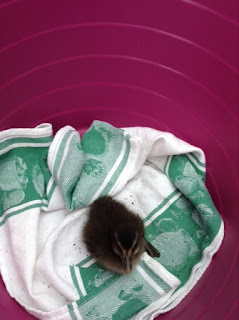 |
| photo by Gordon Parks |
Summer in the City
may look glamorous but the reality is very different. We stay here in the village and go for our city fix later in the year. People come to stay from all over the world, they rent the holiday cottages and liven up the village - the world-wide-web makes it possible. Many of us living here have to cope without a decent mobile phone signal but we are blessed with the internet and that keeps us sane.
"Only connect ""...
"Only connect ""...
Summer in the village
So much comes to us.
We had a a close encounter in June, The cold, wet spring made eider ducklings rarer and later in arriving.
Lost
and Found
What are you?
I get closer and scoop you up
A lucky strike – have you safely enclosed in one hand
Small eider duckling with elegant eye-stripes
Feathers like tiny hairs and a big personality
What was your mother thinking
Leaving you tumbling over our steps?
We find yet another use for a Lidl plastic trug
Lie you in a teatowel and hear you cheep-cheeping
Grab the ipad for a quick snapshot -
A composition in suffragette purple, green and white
With you, a tiny brown dot in the centre
One may take a duck to water but …
When we find a crèche for you to bond with -
The sight of a long, thin man,
topped by an orange hat
Holding a purple trug
and brandishing a duckling
Seems to spook your relatives on the water
Off they all fly each time we approach -
An inter-species misunderstanding
Finally he launches you
Into an unknown future
We scan the sea-
Eider duckling
Is that you?
©Sally Givertz June 22nd 2015
photo by Rob Mckay
Update - now writing this in September 2016 - blog went into the Doldrums we I am steering out of it now.
This is what made me think of that quotation: "My boat is so small and the sea is so wide."
When one sees an eider ducks on a wild day with the waves battering them it seems unlikely that the young will survive but they ride the waves fearlessly and seem somehow glued to the water. They disappear neatly to snatch a quick bite and pop up unperturbed. Blissfully unaware of the magnitude of the sea they just get on with living.
Feeling like a leaf
This blog post stalled because I was feeling like a leaf....
Yesterday I came across this poem by the wonderful Naomi Shihab Nye:
The Art Of Disappearing
Naomi Shihab
Nye
When they say Don't I know you?
say no.
When they invite you to the party
remember what parties are like
before answering.
Someone telling you in a loud voice
they once wrote a poem.
Greasy sausage balls on a paper plate.
Then reply.
If they say We should get together
say why?
It's not that you don't love them anymore.
You're trying to remember something
too important to forget.
Trees. The monastery bell at twilight.
Tell them you have a new project.
It will never be finished.
When someone recognizes you in a grocery store
nod briefly and become a cabbage.
When someone you haven't seen in ten years
appears at the door,
don't start singing him all your new songs.
You will never catch up.
Walk around feeling like a leaf.
Know you could tumble any second.
Then decide what to do with your time.
say no.
When they invite you to the party
remember what parties are like
before answering.
Someone telling you in a loud voice
they once wrote a poem.
Greasy sausage balls on a paper plate.
Then reply.
If they say We should get together
say why?
It's not that you don't love them anymore.
You're trying to remember something
too important to forget.
Trees. The monastery bell at twilight.
Tell them you have a new project.
It will never be finished.
When someone recognizes you in a grocery store
nod briefly and become a cabbage.
When someone you haven't seen in ten years
appears at the door,
don't start singing him all your new songs.
You will never catch up.
Walk around feeling like a leaf.
Know you could tumble any second.
Then decide what to do with your time.
I love this poem and it had just the right words at the right moment for me; the last three lines in particular. If you are feeling fragile or overwhelmed it might help. Decide what to do with your time.
(Note about copyright - I don't usually publish poems by living writers but this one is already up on the internet and I am sure that it will help sales of her poetry rather than reducing them. If anyone thinks I should take it down or just give a short extract please let me know.)
This is a link to information about this outstanding poet. She is not Scottish but I am widening the parameters of the blog - we are all global citizens after all.
Update - now writing this in September 2016 - blog went into the Doldrums we I am steering out of it now.























